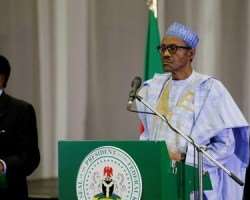My achievements in one year are significant: Buhari

President Muhamudu Buhari on Sunday described his first year in office as a year of triumph, consolidation, pains and achievements.
“By age, instinct and experience, my preference is to look forward, to prepare for the challenges that lie ahead and rededicate the administration to the task of fixing Nigeria. But I believe we can also learn from the obstacles we have overcome and the progress we made thus far, to help strengthen the plans that we have in place to put Nigeria back on the path of progress,” he said.
Just as he has done for the past one year, he heaped all blames for the woes of this nation on the mismanagement of the economy by the under the former ruling party the Peoples Democratic Party, especially in the five years uder for President Goodluck Jonathan. Buhari affirmed his administration's belief in democracy as the form of government that best assures the active participation and actual benefit of the people.
The President said that despite the many years of hardship and disappointment, Nigerians have proved inherently good, industrious, tolerant, patient and generous.
He went on to speak about promises made during electioneering campaigns to tackle problems bothering on security, corruption and the economy, challenges faced on assuming office and gains made thereafter.
He spoke about efforts being made to clean up the Niger Delta region, revive the economy, rid the Niger Delta of vandals and militants as well as curbing corrupt practices.
In all these, President Buhari acknowledged that those who are anti-government and anti-people would resist these changes.
He realises that these individuals or group of individuals would sow divisions, sponsor vile criticisms and incite the public.
All these, the President promised, will not work, as his administration is committed to addressing these issues that have stagnated the nation's growth.
Policy Measures
President Buhari also said that nobody should take the measures put in place by his administration as experimental in nature.
The President said that he knows that there are some unscrupulous people intent on making sure that these plans do not come to fruition, but that his administration remains dogged in ensuring that things work as planned.
“The policy measures and actions taken so far are not to be seen as some experiment in governance…
“The economic misfortune we are experiencing in the shape of very low oil prices has provided us with an opportunity to restructure our economy and diversify. We are in the process of promoting agriculture, livestocks, exploiting our solid mineral resources and expanding our industrial and manufacturing base.
“That way, we will import less and make the social investments necessary to allow us to produce a large and skilled workforce.
“Central Bank of Nigeria will offer more fiscal incentives for business that prove capable of manufacturing products that are internationally competitive. We remain committed to reforming the regulatory framework, for investors by improving the ease of doing business in Nigeria,” he said.
Food Sufficiency
In the meantime, the President is also assuring Nigerians that efforts have been made to develop the agriculture sector.
President Buhari says that it has put efforts in place to ensure that Nigeria becomes food sufficient.
“The first steps along the path of self-sufficiency in rice, wheat and sugar – big users of our scarce foreign exchange – have been taken.
“The Labour Intensive Farming Enterprise will boost the economy and ensure inclusive growth in long neglected communities. Special intervention funds through the Bank of Agriculture will provide targeted support. Concerns remain about rising cost of foods such as maize, rice, millet, beans and gari.
“Farmers tell me that they are worried about the cost of fertilizers, pesticides and the absence of extension services. The federal and state governments are on the same page in tackling these hurdles in our efforts at increased food production and ultimately food security.”
